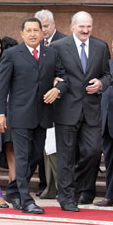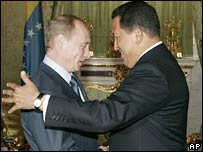Billowing clouds of tear gas...It hardly came as a surprise. After some not very fruitful attempts at on-site mediation, the National Guard went after the Fuerza Solidaria protest pretty heavy handedly. At about 5:30 the tear gas started, and I have to say that I've never seen that much tear gas used against such an innocuous demonstration. The Guardsmen, who already outnumbered the demonstrators by at least 2 to 1, fired canister after canister into the little crowd. There were some reports of rubber bullets being used as well. It seemed like an absurd overreaction: the demonstrators had been peaceful throughout. A couple of women just passed out under the thick cloud of gas. The guard prevented municipal ambulances from reaching the scene, which again seemed entirely out of hand. On the other hand, in the first world they might have gone in with batons swinging and arrested half the crowd. At least they stopped short of that.
Why?, is the obvious question. The crowd had its municipal permits in order, was unarmed, didn't threaten anyone. Some people think this was basically a show of force, the government putting other potential demonstrators on notice that the velvet gloves have come off. But the gorila-tactics seem more likely to embolden the opposition, who see it as another sign that the more-or-less benign phase of chavismo is ending and that an out-and-out police state is being instituted in stages. One way or another, it's a bad sign that the government is now declaring certain parts of Caracas no-go areas for opposition demonstrators. The rationale, that they were too close to the air-force base's newly declared "security zone" seems pretty weak. In any event, the government has no clear legal basis for declaring security zones in the first place, and a very clear and explicit constitutional obligation to let people demonstrate where and when they want, so long as they do so peacefully and with the proper permits.
Overall, yesterday's little to do outside La Carlota should've been page 17 news. Instead, the little media-circus that ensued generated huge front page headlines, and disturbing pictures of people getting hammered by the guard. How this helps the government's case is beyond me.
Please comment responsibly:
|
The morning traffic report, Caracas style...Another fun day of rumors flying around cell-phones and inboxes. At about 8:50 am my favorite radio show was interrupted by a breathless reporter's "breaking news" item, where she told us that traffic was heavier than usual on Caracas main east-west highway, not due to an accident or anything like that, but because a convoy of National Guard Armored Personnel Carriers had decided to park in the middle of the eastbound lane. As per usual, there was no official explanation, but the move came after another bout of speculation about imminent coups and-or self-coups/counter-coups.
These little outbursts of worry have been happening so frequently in the last few months most people kind of dismiss them with a resigned shrug of the shoulders these days. If I had a nickel for every time somebody's called to tell me that they have it from "an inside source" and that "this time the coup really really is going to happen tonight, for sure, honest," I'd have, well, a bunch of nickels. But light tanks rolling alongside you on your morning commute, well, that's different.
Union Radio's
little write-up (Spanish only) gives a good feel for today's zaniness. One of their reporters (a gutsy one, for sure) followed the tanks to their eventual destination, the La Carlota Air Force Base in the east of the city, and actually shoved a microphone in front of one of the commanding officers on the scene to ask him what on earth was going on. His answer, basically, is "we don't know either, we were just told to move these troops here." Great. Even the generals on the scene don't know why they're doing what they're doing.
The working guess is that they were moved there to counter a "vigil" that had been called by this right wing opposition grouplet called Fuerza Solidaria, for this afternoon right outside the Air Force base. Fuerza Solidaria is a fairly disreputable outfit, really: about as reactionary as reactionary gets and led by a Lyndon LaRouche followers. Seriously. This guy (Alejandro Peña Esclusa is his name) got arrested just last night by the secret police for trying to incite a coup. Frankly, as distasteful as the notion of a chavista secret police is, Peña Esclusa had it coming: he'd been very openly urging a rebellion in the last few days. All the mainstream/sane opposition leaders had been trying to distance themselves from the guy and the lunatic fringe he represents, saying Peña Esclusa was just giving Chávez the excuse he wanted to crack down on the opposition as a whole.
What's really troubling is why the government feels so damn threatened by this guy, who nobody in the opposition takes seriously. Either Chávez is getting seriously paranoid, or they know something we don't know. The sad thing is that by throwing him in jail they're turning him into a martyr, giving him a far, far higher profile than he's ever had before or, frankly, deserves. But maybe that's the point: by making him a cause celebre, the government can then liken the entire opposition with Fuerza Solidaria, painting us all as deranged reactionaries. Then they can crack down. That might sound far-fetched to you, but the political debate in this country has gone so far off the rails that slightly conspiratorial explanations like that pan out all the time.
And the strategy seems to have worked moderately well: on its own, Fuerza Solidaria couldn't have brought out more than 100 people or so to their little demo outside La Carlota. As it stands, it looks like they've turned out a few hundred. Nothing like the big marches the opposition has put together in the last few months, with literally hundreds of thousands of marchers. But still, enough for the government to continue its broad strategy of painting the opposition with a broad, radical-right-wing brush.
With any luck these guys will call it a day before night fall, go home, let the soldiers have a quiet night in. But the situation's so tense now, and so many people have a vested interest in courting a violent confrontation, it's impossible to tell.
Amanecerá y veremos...
Please comment responsibly:
|
Style conundrumsI'll admit I’ve been finding it more and more difficult to write about Venezuela without sounding either alarmist or flippant, (or even worse, an odd combination of the two.) It’s a sign of the times here, that’s for sure. These days, what I find it hardest to convey to my friends who live outside Venezuela is this strong undercurrent of farce that now permeates public life here. Of course, I’d love to pretend that events here are of the utmost gravity, a completely serious class/social struggle a la Chile in the Allende years. And certainly, some of what’s been happening here is about as serious as serious gets: for a country as close to Colombia as we are, the ongoing rumblings about people setting up paramilitary groups and training intensively out in the countryside are enough to make the hair on the back of your neck stand. But writing about it that way wouldn’t feel quite honest, because the slow-motion train-wreck that is Venezuela under Chávez is full of little, slightly absurd side-shows, newspaper stories that teeter on the border between alarming and just plain silly.
Today’s far side news story concerns an active-duty Army General, Rommel Fuenmayor, who decided to show up at the Supreme Tribunal in full military regalia to introduce a writ for the impeachment of President Chávez. General Fuenmayor was involved in the April coup attempt, but like a lot of the generals involved he still hasn’t been kicked out of the army. So you sit there, remote control in hand, watching one of the army’s top-ranked officers standing outside a courthouse ranting and raving about the crimes committed by his commander in chief. OK! Of course, I agree that Chávez should be
impeached, but that does nothing to abate the Alice in Wonderland feel of the whole episode.
Yesterday, the surreal story du jour concerned the Banks Superintendent, who gave a press conference to denounce the nation’s bankers for being unwilling to keep lending money to the government. Now, you might think the banks’ unwillingness to keep bankrolling the government has something to do with the fact that Chávez has been calling the bankers counterrevolutionary swine each time he gets close to a microphone recently, accussing them of plotting an “economic coup”, of conspiring to bring down his government by shutting down the economy (and committing lemming-like commercial suicide in the process, of course.) Now, by now we’re used to this kind of shrill nonsense coming out of Chávez, but the Bank’s Superintendent? The head of the regulatory agency that’s supposed to look after the stability and viability of the financial system? Grrreat!
Actually, the government’s money problems have been the source of a lot of the recent barely believable news. The government is basically brokeat this point: its income is about 2/3rds of its expenditures, which presents a pretty obvious problem. Public sector workers get paid months behind schedule, schools get their electricity cut off cuz the ministry is late paying the electric utility. The finance minister lives in a frantic scrap to figure out how to keep the whole aparatus running, but it’s a losing battle.
For the last three years they’d dealt with these chronic deficits by asking for loans…more and more new loans at higher and higher interest rates. In three years they’ve quintupled the Internal Debt, to the point that almost 2/3rds of the loans in Venezuelan banks’ portfolios right now are loans to the government. This is a problem, since that means that those 2/3rds can’t go to finance businesses, or farmers, or people who want to buy cars or apartments or use credit cards. As the government gobbles up more and more of the available credit, the rest of the economy finds it harder and harder to get affordable credit, which has led to a huge increase in bankruptcies, big hikes in unemployment, and a recession that will see the economy shrink by about 7% this year alone. Ouch.
But the Banks Superintendent sees things differently. If only two thirds of bank lending is going to the government, he reasons, then that means that a WHOLE THIRD of it is NOT going to the government, doesn’t it? Outrageous!, he says. How dare banks claim that they’re all tapped out when they still have a whole third of their portfolios lent out to piddling things like, y’know, farmers or companies or home buyers?! Must be a conspiracy to undermine the glorious people’sgovernment. Economic coup, for sure. So this guy’s idea, it seems, is that until 100% of the banks’ loan PDVSA portfolios are in government debt, they have no valid reason not to keep buying government bonds. Oh dear. This is the head of the Banking regulatory agency we’re talking about. Oh dear.
So, y’know, you read news like that and you just sort of shake your head slowly and wonder, well how do I write seriously about this man’s incredible, rampant idiocy? Wouldn’t that just give his argument an aura of seriousness that it obviously doesn’t deserve? How do I deal with that, as a reporter? A lot of the public agenda here ends up putting me into that same broad conundrum.
The government’s mostly given up on trying to cover its deficit with loans. It didn’t help that at the same time his ministers were going around frantically trying to get new loans, Chávez was giving fire-breathing speeches pledging to turn over to their workers any companies that close down to participate in a protest lock-out against his government. As everyone knows, nothing boosts market confidence like the threat of massive expropriations.
No, by now the government’s made its peace with the idea that nobody will lend them any more money. Instead, they’re turning now to that tried-and-true method of deficit financing: the printing press. It worked so well in Weimar Germany and 1980s Argentina, why not try it here? The new plan is to print about 6 trillion new bolivars. For the economics-minded in the audience, that’s about 38% of current M2. For the non-economics minded, that means that they’re planning to print 38 new bolivars for every 100 currently in circulation. Depending which economist you ask, this is either the end of the world, or merely a complete disaster. The only possible outcome is massive inflation. They’ll cry us the standard river about how they can’t cut their revolutionary programs for poverty abatement just because they can’t raise the money to pay for them. And they’ll ignore the bulging heaps of studies and data showing how spikes in inflation screw the poor first and worst. It’s such an anachronism, really, it’s just embarrassing. The rest of Latin America tried this shit 20 years ago, crashed and burned 15 years ago, and has long since gotten over it. But Chávez is just determined to re-invent the hyperinflation wheel. Who can stop him?
Of course, in a brief little write-up like this I can barely scratch the surface of the proliferation of really strange we’ve been reading in the newspapers here. I can’t really go into the story of the guy who claimed he used to be the chauffeur for a well-known chavista congressman and now says his boss used to take him to paramilitary training sessions where army instructors taught die hard chavistas how to shoot it out with any opposition group that tries to topple Chávez, nor about how the congressman in question claims he’s never met his supposed driver. I don’t have the room to dissect Chávez’s new theory that plotting a coup is tantamount to international terrorism and that the April coupsters are on a moral par with Osama Bin Laden (an odd position for the guy who led two failed coups in 1992, and who was staging public celebrations of the of the coup attempt anniversaries just 8 months ago.) And I can’t even start to tell you about the completely public appeals some opposition members have started making in the radio, TV, and newspapers, basically calling the army wusses for taking so damn long to just topple “el loco.”
All I can say for now is that the newspapers here read more and more as though they were written by Gabriel García Márquez: a series of utterly fantastical stories bordering on simple nonsense, made credible only by the fact that they’re written in a totally deadpan style. Reporters here are really good at that. With the best of them you’re almost fooled into forgetting that lurking just behind that just-the-facts-ma’am style, a hack is laughing his head off about the utter silliness of the news he has to report.
Please comment responsibly:
|

 Chavez Reelection Blog: Katy documents the government's use of public resources for Chavez's partisan advantage.
Chavez Reelection Blog: Katy documents the government's use of public resources for Chavez's partisan advantage.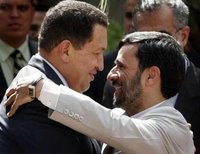

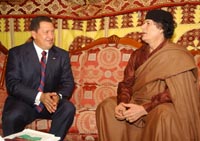

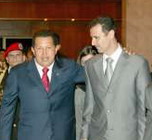
 Site feed
Site feed 